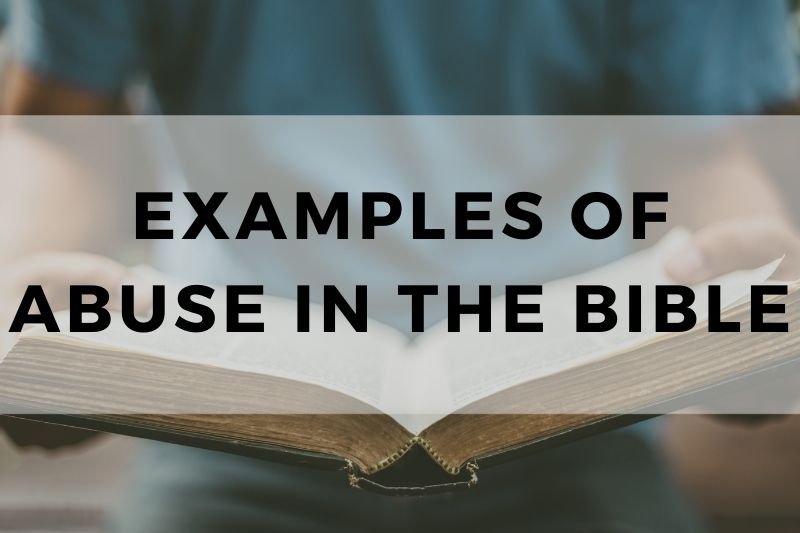
Abuse is a painful reality that has existed throughout history, even within the pages of the Bible. In this article, we will explore various examples of abuse found in the Bible. These stories serve as a reminder that abuse, in its many forms, has been a part of human experience for centuries. By examining these narratives, we can gain insight into the consequences of abuse and the importance of seeking justice and healing.
10 Examples of Abuse in the Bible
#1. Cain and Abel (Genesis 4:1-16)
Cain’s jealousy towards his brother Abel led him to commit the ultimate act of abuse by killing him. This tragic event within the family showcases how unchecked emotions like anger and resentment can escalate to violence and destruction, resulting in irreversible consequences.
#2. Joseph and His Brothers (Genesis 37)
The story of Joseph being sold into slavery by his own brothers sheds light on how abuse can manifest in the form of envy and betrayal within familial relationships. The act of selling Joseph into slavery not only caused him immense suffering but also fractured the bond between siblings, illustrating the destructive nature of abuse.
#3. Hagar and Ishmael (Genesis 16, 21)
Hagar and her son Ishmael faced mistreatment and abandonment at the hands of Abraham and Sarah, highlighting the vulnerability of marginalized individuals in society. Their story serves as a poignant reminder of the abuse faced by those who are marginalized and voiceless, emphasizing the importance of compassion and empathy.
#4. The Israelites in Egypt (Exodus 1-14)
The enslavement and oppression of the Israelites by the Egyptians exemplify systemic abuse and injustice on a grand scale. The Israelites’ suffering under the harsh rule of the Egyptians underscores the devastating impact of power dynamics and exploitation, emphasizing the need for justice and liberation.
#5. Jephthah’s Daughter (Judges 11:29-40)
Jephthah’s decision to sacrifice his daughter as a burnt offering showcases the abuse of power and the tragic consequences of making impulsive and irreversible vows. This heartbreaking story serves as a cautionary tale about the dangers of unchecked authority and the devastating effects of abusive actions.
#6. The Concubine in Gibeah (Judges 19)
The brutal abuse and murder of the concubine in Gibeah by a violent mob reveal the horrors of unchecked violence and disregard for human life. This tragic event serves as a stark reminder of the consequences of dehumanization and cruelty, highlighting the urgent need for compassion and justice.
#7. David and Bathsheba (2 Samuel 11)
David’s affair with Bathsheba and the subsequent murder of her husband Uriah exemplify the abuse of power and sexual exploitation. This story sheds light on the devastating impact of manipulation and coercion within relationships, emphasizing the importance of respect and consent.
#8. Tamar and Amnon (2 Samuel 13)
The story of Amnon raping his half-sister Tamar illustrates the devastating impact of sexual violence and abuse within families. This tragic event highlights the importance of addressing and preventing abuse within familial settings, emphasizing the need for support and protection for survivors.
#9. Job (Book of Job)
Job’s enduring suffering and loss raise questions about the psychological abuse of despair and hopelessness. His story challenges conventional notions of justice and fairness, highlighting the complexities of human suffering and the importance of resilience and faith in the face of adversity.
#10. Jesus’ Crucifixion (Gospels: Matthew, Mark, Luke, John)
The unjust condemnation, torture, and crucifixion of Jesus represent the ultimate example of abuse and injustice. Despite facing unimaginable suffering, Jesus’ story offers hope through redemption and forgiveness, emphasizing the transformative power of love and compassion in the face of cruelty and violence.
Closing Thoughts
The examples of abuse in the Bible serve as powerful reminders of the destructive nature of unchecked power, violence, and exploitation. These stories highlight the importance of compassion, justice, and empathy in addressing and preventing abuse within relationships, families, and communities.
By reflecting on these narratives, we are called to stand against injustice, support survivors, and strive for a world where love, respect, and dignity prevail. May we learn from the lessons of the past and work towards creating a future where all individuals are valued, protected, and empowered to live in peace and harmony.
